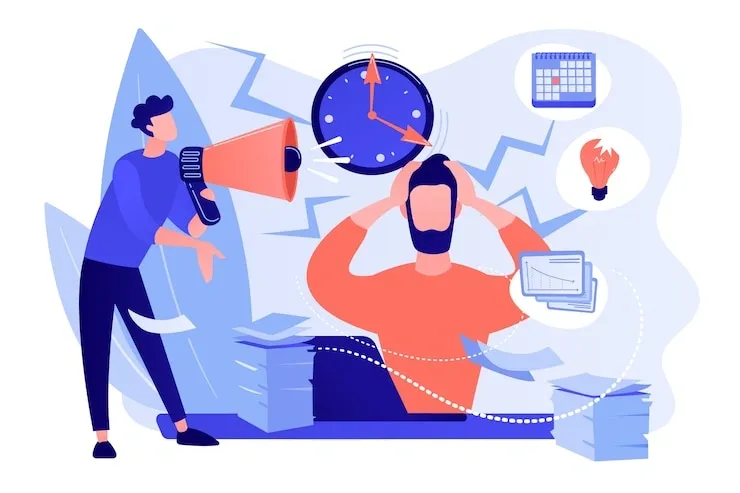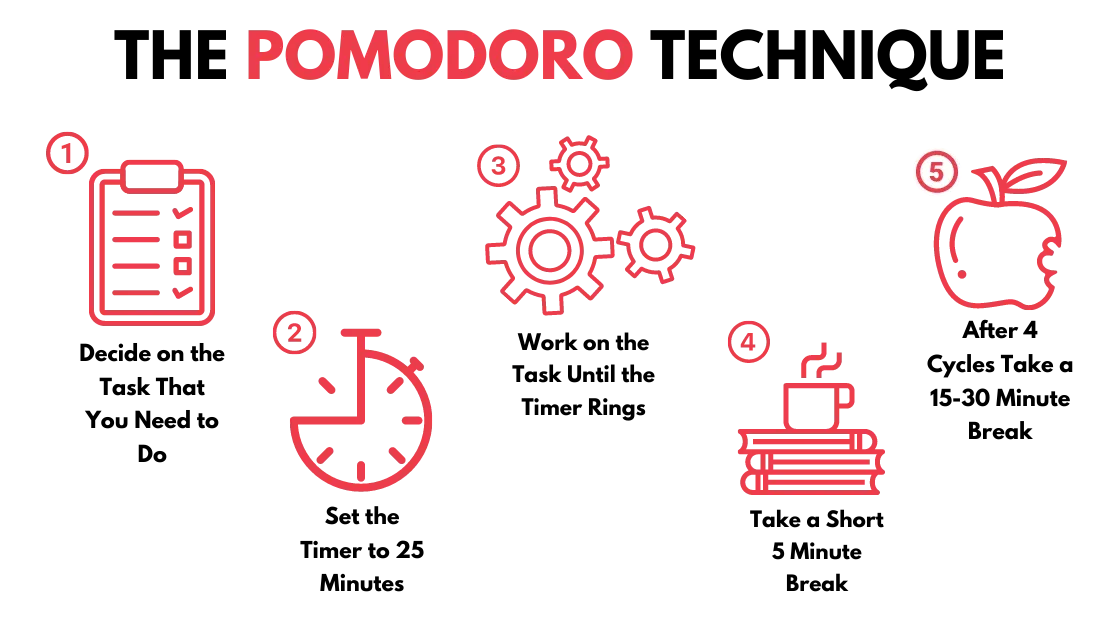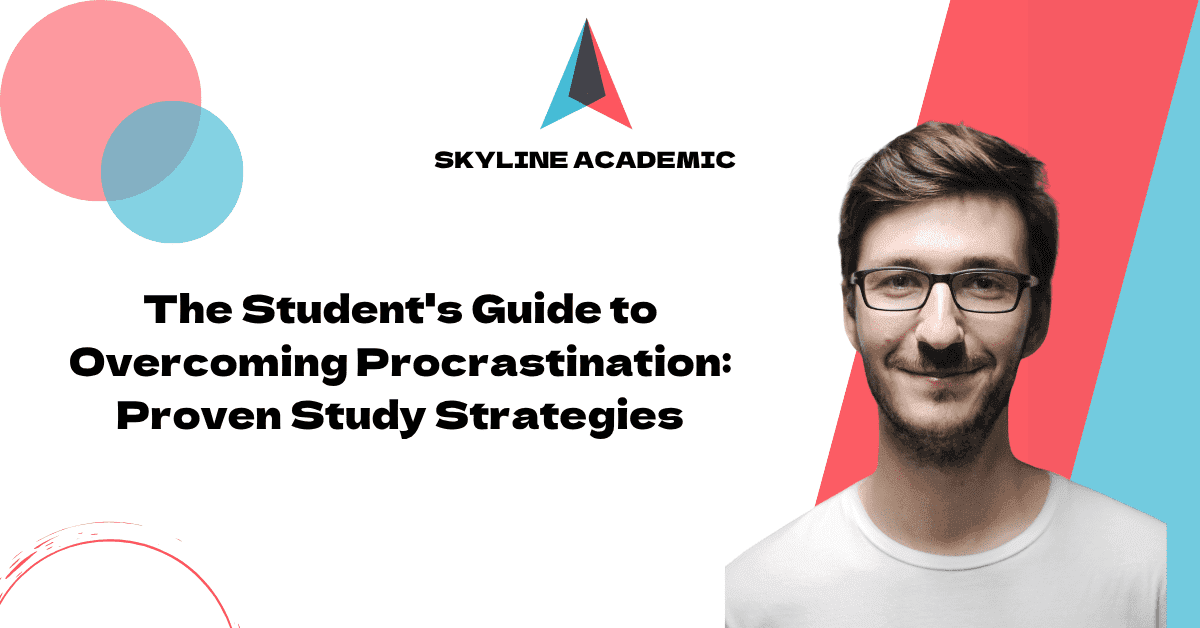The Student’s Guide to Overcoming Procrastination: Proven Study Strategies
About 20% of people participate in chronic procrastination during college and beyond. Procrastination goes beyond an occasional habit. These problems are systemic and affect much of the population.
Procrastination has little to do with poor time management or laziness. The root cause often stems from emotional regulation, where negative feelings like self-doubt, anxiety, and boredom make us avoid tasks. On top of that, it can increase levels of stress hormones like cortisol and adrenaline. This surge might lead to serious health issues including cardiovascular disease.
You’re not alone if you struggle to overcome procrastination. Students face this challenge every day, though many believe procrastinators lack motivation. Research points to different factors like hope, resiliency, optimism, and self-efficacy that shape procrastination behavior.
Let’s take a closer look at solutions that have helped countless students break this habit. We’ll cover practical strategies you can start using today – from breaking tasks into smaller pieces to using productivity tools and timers. First, we need to understand why we procrastinate, then we can work through proven methods to overcome it together.
Understanding Why We Procrastinate

Image Source: Freepik
“Procrastination is, hands down, our favorite form of self-sabotage.”
— Alyce P. Cornyn-Selby, Author and business consultant
Psychological factors, not just laziness, cause procrastination. College students need to understand why it happens to find budget-friendly ways to break this habit.
Fear of failure and self-doubt
Studies show that fear of failure and self-doubt cause procrastination more than poor time management. Students get anxious about their tasks and put off work to feel less anxious [1]. This delay becomes their shield – they use it as an excuse if they don’t perform well, which protects their self-image [1].
Self-esteem plays a vital role in this behavior. Research reveals a strong negative relationship between academic procrastination and self-esteem [2]. Students who lack confidence in their success often hurt their chances by waiting until the last minute [1]. They can blame their failure on lack of time instead of their abilities.
Emotional avoidance and stress relief
We used procrastination mainly to manage our emotions. Research suggests people delay tasks that make them feel negative emotions to feel better right away [3]. Yes, it is common for students to unconsciously choose procrastination when assignments make them feel anxious, bored, or frustrated [4].
This quick relief has its downsides. Procrastination might reduce stress now, but it ended up creating more stress later [3]. The procrastination-health model shows that unnecessary delays create extra stress – you worry about putting things off and what it all means [5].
The myth of working better under pressure
Many college students think they do better work under pressure – this myth keeps procrastination going. Research proves that pressure makes everyone perform worse [6]. Some people handle pressure better than others, but studies show it hurts everyone’s performance [6].
This belief sticks around because of how our brains process rewards. Success with last-minute work reinforces the behavior as memories of stress fade away [7]. Then we remember only the achievement, forgetting all about the anxiety, lost sleep, and lower quality work that came with it.
Learning about these psychological triggers helps develop effective ways to beat procrastination in school.
Building Awareness and Self-Reflection
Your trip to beat procrastination starts with looking at yourself honestly. You need to understand your personal procrastination patterns before trying solutions. Psychology research confirms that “awareness and self-knowledge are the keys to figuring out how to stop procrastinating” [8].
Identify your procrastination triggers
Research shows several common triggers that make us avoid tasks. You can tackle procrastination better by knowing what makes you put off specific assignments:
- Boredom: Tasks that don’t intellectually stimulate you
- Frustration: Activities that leave you feeling helpless
- Difficulty: Complex assignments that need lots of mental effort
- Stress: Situations that make you anxious
- Ambiguity: Unclear instructions or undefined expectations
- Meaninglessness: Tasks lacking personal relevance [9]
Think about which triggers affect you most often. To name just one example, see if you avoid challenging assignments or ones with unclear instructions. You can develop better solutions once you know your specific patterns.
Understand the role of self-protection
Procrastination acts as a psychological defense mechanism. We create a built-in excuse for potential failure by delaying work – “I didn’t have enough time” [8]. This protects our self-esteem because we can blame circumstances instead of our abilities.
Perfectionists face this pattern more often. They might delay work to avoid having their worth judged through their work [10]. Breaking this cycle becomes easier when you realize that procrastination hurts more than it helps.
Track your habits and thought patterns
A habit tracking system helps create accountability and teaches you about yourself. Research proves that people who track their progress succeed by a lot compared to those who don’t [11].
Writing about your procrastination experiences helps identify emotional triggers and feelings [12]. This approach reveals patterns over time. You’ll spot recurring thoughts like “I’ll do better with more time” or “I work best under pressure” that keep the cycle going.
You’ll develop strategies that match your procrastination style through regular self-reflection.
Proven Strategies to Overcome Procrastination

Image Source: Luxafor
“You may delay but time will not, and lost time is never found again.”
— Benjamin Franklin, Founding Father of the United States, polymath, and inventor
Let’s dive into practical strategies that can help college students beat procrastination, now that we understand why it happens. These techniques will change your study habits if you stick with them.
Break large tasks into smaller steps
Large assignments become less scary when you break them into manageable chunks. This technique, known as “Swiss Cheese It,” lets you tackle big tasks in short bursts. Here’s how:
- Create steps like “find 3 sources,” “outline introduction,” and “draft first paragraph” instead of just “write research paper”
- Build momentum by finishing one small step at a time
Students feel less anxious and more satisfied when they complete these smaller tasks.
Use the Pomodoro technique
The Pomodoro technique splits your work into focused 25-minute blocks with short breaks. This method helps you stay on track and makes study sessions feel easier. Here’s the process:
- Choose one specific task
- Set a timer for 25 minutes and focus completely
- Take a 5-minute break when the timer rings
- Take a longer 20-30 minute break after four cycles
Your brain remembers information better in shorter, focused bursts – that’s what research tells us.
Create a flexible but realistic schedule
Your schedule should match your natural energy patterns. The most challenging tasks belong in your peak productivity hours. Remember to leave room to breathe between assignments and plan for unexpected events.
Set clear and achievable goals
The SMART framework (Specific, Measurable, Achievable, Relevant, Time-bound) works best for setting goals. “Complete three calculus problem sets by Thursday” beats vague goals like “study more.”
Reward progress with small incentives
A personal reward system keeps you motivated. Give yourself something nice after finishing tasks – 30 minutes of TV without guilt, a quick walk, or your favorite snack. These rewards trigger dopamine pathways that help build better study habits.
These strategies work even better with support. Skyline Academic’s tutors can help you apply these techniques to your specific coursework and kick procrastination to the curb.
Creating a Productive Environment and Mindset
Your surroundings and mindset play significant roles to curb procrastination. Research shows that distractions make our bodies take about 7 minutes to get back into focus. This could make you lose nearly 40% of your productivity [13].
Remove distractions from your study space
External distractions like technology, people, or background noise affect your focus by a lot. These steps will help you create a study environment that works:
- Pick a dedicated spot just for studying to strengthen its connection with learning
- Find out what study conditions suit you best—complete silence or background noise
- Think over using headphones, white noise, or instrumental music to block unwanted sounds
- Let roommates or family members know about your study schedule to set up “quiet zones”
Physical organization makes a difference. A clean, clutter-free workspace helps you concentrate and cuts down visual distractions that steal your attention from important tasks.
Use tools like Forest or Cold Turkey
Technology can be both a distraction and an aid to your focus. Some apps designed to curb procrastination include:
Forest app takes a creative approach. You “plant” a virtual tree that grows while you work but dies if you leave the app. This creates a visual motivation to stay focused [14]. The company plants real trees in dozens of countries when people use the app regularly.
Cold Turkey offers a different solution. It blocks distracting websites and applications during study sessions without any workarounds until your timer ends [14]. This firm approach helps build better study habits by removing digital temptations completely.
Practice self-compassion and positive self-talk
Self-compassion means being kind to yourself instead of harsh when facing challenges. Kristin Neff defines it to cover self-kindness, recognition of common humanity, and mindfulness [15].
Research proves self-compassion reduces procrastination and lowers associated stress [15]. Instead of criticizing yourself for past procrastination, use encouraging words like “I learn from my mistakes” or “I don’t know this yet, but I will.”
Build accountability with peers or mentors
Accountability groups utilize social commitment to keep you on track. Regular meetings to share progress and goals add structure to tasks that might feel isolating otherwise [16].
Skyline Academic’s live tutors can help you develop individual-specific accountability systems. They provide guidance to break free from procrastination habits.
Conclusion
You need self-awareness and action to beat procrastination. This piece shows that procrastination isn’t about being lazy. It comes from complex factors like fear of failure, emotional avoidance, and wrong beliefs about working under pressure.
Your first big step toward real change is spotting your own procrastination patterns. The best strategies for you depend on knowing your triggers and thought processes.
We’ve covered many practical techniques that help students with delayed work habits. These include breaking tasks into smaller pieces, using the Pomodoro technique, making flexible schedules, setting SMART goals, and creating reward systems. A focused environment and self-compassion boost your chances to stay on task.
Beating procrastination takes time. Small improvements you make consistently lead to big changes in your study habits. You’ll hit some roadblocks, but each try makes you stronger and closer to your academic goals.
Let Skyline Academic’s tutors and assignment help features support your journey. Our experts will show you how to use these strategies in your courses and build better habits.
Better time management and less procrastination challenge many students. Notwithstanding that, the right strategies and mindset can change how you handle academic work. Start using these techniques today. You’ll feel more confident and free when you take charge of your study habits.
FAQs
Q1. How can I break the cycle of procrastination?
To break the cycle of procrastination, start by identifying your triggers and understanding the underlying reasons for your delay. Then, implement strategies like breaking tasks into smaller steps, using the Pomodoro technique, and creating a realistic schedule. Remember to practice self-compassion and build accountability with peers or mentors.
Q2. Is procrastination just a sign of laziness?
No, procrastination is not simply laziness. It’s often linked to complex psychological factors such as fear of failure, self-doubt, and emotional avoidance. Understanding these underlying causes is crucial for developing effective strategies to overcome procrastination.
Q3. How can I create a more productive study environment?
Create a productive study environment by removing distractions, choosing a dedicated study space, and using tools like Forest or Cold Turkey to block distracting websites. Also, consider your optimal study conditions, such as noise level and organization, to maximize focus and minimize procrastination.
Q4. Does the “working better under pressure” mindset actually help?
No, the belief that you work better under pressure is a myth. Research shows that everyone performs worse under pressure, not better. This misconception persists because we tend to remember the accomplishment but forget the stress and reduced quality that accompanied last-minute work.
Q5. How can setting goals help me overcome procrastination?
Setting clear and achievable goals using the SMART framework (Specific, Measurable, Achievable, Relevant, Time-bound) can significantly help overcome procrastination. This approach makes tasks more manageable and provides a clear direction, reducing the likelihood of delay and increasing motivation to complete work.
References
[1] – https://link.springer.com/article/10.1007/s10212-024-00868-9
[2] – https://bmcpsychology.biomedcentral.com/articles/10.1186/s40359-024-01731-8
[3] – https://www.mcleanhospital.org/essential/procrastination
[4] – https://www.owlprofessionalcoaching.com/blog/procrastinationismystressrelief
[5] – https://pmc.ncbi.nlm.nih.gov/articles/PMC10049005/
[6] – https://medium.com/@BrendonTowleCoaching/the-myth-of-best-under-pressure-e0d642eeb8e
[7] – https://pcur.princeton.edu/2017/03/research-mythbusters-do-we-work-best-under-pressure/
[8] – https://mcgraw.princeton.edu/undergraduates/resources/resource-library/understanding-and-overcoming-procrastination
[9] – https://nesslabs.com/procrastination-triggers
[10] – https://positivepsychology.com/how-to-stop-procrastinating/
[11] – https://jamesclear.com/habit-tracker
[12] – https://lifeskillsadvocate.com/blog/how-to-use-self-monitoring-to-overcome-procrastination/
[13] – https://www.effortlessmath.com/uncategorized/how-to-create-a-distraction-free-study-environment-10-tips/?srsltid=AfmBOoriuEa3L18hu4eo3WPFgFHplF86lcqdBvu1Qx31gf1eBugcasHV
[14] – https://uwaterloo.ca/future-students/missing-manual/high-school/top-10-best-productivity-apps-students
[15] – https://ggie.berkeley.edu/student-well-being/self-compassion-for-students/
[16] – https://academicresourcecenter.harvard.edu/2023/10/11/creating-accountability-groups/
